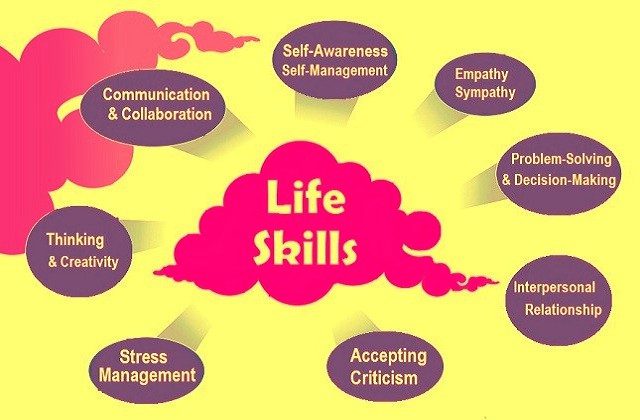
by Content Team | Feb 28, 2023 | Self-Awareness
Being accepted is something that almost all people want. After all, we evolved to thrive in social settings where getting along with others and earning respect and trust of our peers are the benchmarks for success.
Humans are social beings that desire connection, intimacy, and relationships with others. We all want to connect with people and feel accepted; part of that desire is caring about what other people think of us.
But what if you’ve started to give excessive importance to the judgments of strangers and friends? If you’re being held back by worrying about other people’s thoughts, we have some advice to help you stop.
Here’s how you can consider what others may think about you less.
5 Steps to Stop Caring What People Think of You
- Stop apologizing.
Say apologize if you’ve done anything wrong, and it’s right to do so in that circumstance. But resist the urge to constantly apologize for being who you are. There is no genuine reason to apologize for standing out from the herd, having differing beliefs, or caring about something important to you.
- Remember what is important to you.
Use your freedom to conduct actions that are motivated by your aims. Since this is your life, don’t try to impress others; instead, focus on what’s essential to you.
- Get out of your head.
Everyone will judge you. Yet it’s also crucial to remember that people don’t judge you nearly as harshly as your mind would have you believe. But why stress over things you can’t change? Instead, focus on making your decisions the best you can for your satisfaction since that matters most—how YOU feel about them.
- Be picky about who you surround yourself with.
Being around positive influences makes it simpler to be authentic and feel good about life than spending time with people who undermine your goals and drain the life force from your ambitions.
Even if living each moment as entirely authentically as possible is the ultimate objective, any progress is worth celebrating.
- Learn the appreciate the individuality of others.
Make an effort to celebrate and support others’ uniqueness. Avoid gossiping about people, having negative thoughts about people you don’t understand, and, most importantly, resisting the urge to pass judgment.

by Content Team | Feb 24, 2023 | Changing Personal Habits
The comfort zone is a familiar collection of typical actions, routines, and behaviors. It consists of your typical routines and behaviors where you encounter minimal risk and minor tension and worries. Unfortunately, those who are said to “live in their comfort zone” typically take few chances and get few benefits. These are some things you may do to push yourself beyond your comfort zone.
10 Ways to Step Out of Your Comfort Zone
You can do ten things right now to push yourself outside your comfort zone.
- Make an “Uncomfortable” list.
What makes you uneasy?
Cold showers, getting up early, running, etc. A fantastic technique to see what you can do is to make a list of the things that are outside of your comfort zone.
- Film yourself
An introvert’s worst nightmare may be having to appear in front of the camera. Yet, it can also aid in improving linguistic ability and confidence. The secret is to engage in activities you find so enjoyable that you lose sight of the camera. Although it could initially feel awkward, your skills will improve if you persevere.
- Ask deep questions
Talking openly and frequently on various subjects is straightforward and can provide interesting outcomes. Another crucial skill for learning about your fears and pushing you over what you already know is the ability to ask excellent questions.
- Start a conversation with a stranger.
You enter the learning zone and the terror zone by engaging in conversation with a stranger. You might leave the conversation having made a new friend or learning something.
- Start small
Only a little bit of a routine change will do! Try dining alone at a common table if you often eat alone at your stall rather than with your coworkers. If you feel confident enough, consider inviting your coworkers for a lunchtime conversation or scouting out a new dining location.
- Become a “Yes” person
A friend may enthusiastically say, “Let’s go on a road trip!” or “Let’s try out this new restaurant!” Saying yes will encourage you to step outside of your comfort zone, even if you don’t like eating new foods or are hesitant to leave your hometown.
- Try a new skill
You enter the learning zone by attempting something new! Consider adding a new talent to your repertoire that you have not planned out in detail.
- Reframe your stress
Feeling anxious and stressed about moving outside your comfort zone may be a real drag, so why not change it? The question is, what are you going to do with it?
- Get on stage
77% of people say they are afraid of speaking in front of groups of people. Why not attempt to go on stage to overcome your fears? Public speaking will aid you in overcoming your fear of it over time and build your neuroplasticity so you may push yourself outside of your comfort zone in other areas of your life.
- Reward yourself
Rewarding yourself for each task you complete is one of the finest strategies to make sure you complete your journey.

by Content Team | Feb 23, 2023 | Self-Awareness
The key to reality is self-awareness, and the moment we learn to control our ideas, we are released from the weight of unintentionally shaping our reality. It is our responsibility to take action to alter the outcomes. Your progress and capacity to develop into your highest self will be hampered if you remain stuck in the past or keep thinking the same constricting thoughts.
- Wake-up call:
We need to work on using our minds, which is the main cause of our suffering, confusion, and issues. We’ve been trained to focus the majority of our efforts on the outside while waiting for happiness on the inside. This is why most people who become materially wealthy will tell you that “money can’t buy happiness.” Time is wasted while you try to fill the gap, slowly killing you. Don’t waste happy moments, hoping that they will come at some point in the future.
- Know thyself:
We deal with a lot of negativity and aren’t even aware that we are creating it since the mind has been taken away from the genuine self. Knowing oneself is the key to calmness, the connection to compassion, and the ability to escape from madness. Start focusing on the things that are receiving your energy.
- We just want to be happy:
Our true selves want affection, joy, contentment, and all other positive emotions. Do not think that it is anything outside of oneself. The most upsetting situations occur when we attach our happiness to objects and then lose it. Because of this, you must alter how you perceive reality to experience joy in all circumstances. You change your energy to begin to live from a reality you were unaware of. All it needed was a mental shift for you to find alignment with your feelings.
- Invest in yourself:
Invest in your body, mind, and soul. Pay attention to the factors that shape reality. Discover how much your reality changes once you begin to invest in yourself. Vow today that you will stop delegating your authority to other people or things. True personal empowerment comes from having the ability to control your ideas and shape reality. Your time is valuable; don’t waste it on those who don’t value you for who you are. You should also always value yourself before others value you. You can improve, discover your purpose, and establish a connection with the source of your strength at every moment of your life. Keep your attention focused on it.
- Focus:
Do not wait for approval from others to live your life as you have chosen to. That is a complete waste of time. Who cares? Simply distance yourself. Your energy is yours; take it back!
- Grow:
Avoid becoming involved in drama and negativity. Nothing saps your creativity more than pointless arguments and chats about others. So much is wasted and damaged when we use our energies this way. Let’s go on from this point. Increase the vibration. Let’s use our power to help instead of to hurt.
- Elevate:
Many people are too busy to change, have no genuine plans, or have purposeless lives. Don’t let them divert your attention. Instead, own your truth and who you are. Standing up for your beliefs gives you personal empowerment.
- Determined:
You won’t want to continue doing what you used to do as your vibration rises. You’ll stop caring what other people think of you. Your desire to live fully, love sincerely, and pay close attention to everything that brings you joy will suddenly increase.
Final Words
Make a promise to yourself to be so resilient that nothing can jar your tranquility. To devote so much time to bettering oneself that one has no time for criticism of others. Being too big for concern, noble for anger, powerful for fear, and joyful to allow problems to exist. Declare, “Today, I choose to evolve.”

by Content Team | Feb 21, 2023 | Self-Awareness
“Money cannot buy happiness” is one phrase that we’ve all heard. But in actuality, we all spend money; for most of us, it is a finite resource. So how can we spend our hard-earned money to make us happy? When you make your next purchase, consider the beneficial insights from psychological studies about the relationships between wealth and happiness.
- Being Rich Isn’t Necessarily the Way to Happiness.
Happiness is influenced by money. Ask anyone who does not have it. For example, a handsome salary can help us live in safer homes, receive better nutrition and medical care, and have fulfilling jobs. The positive effects of money, like buying your dream house, are frequently offset by the negative effects, like working long hours or in more stressful jobs to maintain that income.
- Doing Makes us Happier than Having.
Most people believe that material possessions will bring them greater happiness than experiences. Physical items, like the most recent iPhone, handbag, or automobile, last longer than activities like attending a concert, taking a cooking class, or taking a vacation. We are joyful when we buy goods, at least in the short term. Yet, with time, we become accustomed to new things, and although they may have made us joyful and enthusiastic, they gradually become the new normal and disappear into the background.
Yet, the joy from spending money on activities tends to grow over time. We frequently share our experiential purchases with others, which is one reason.
- Consider Spending Money on Others.
Most people believe investing in themselves would result in greater happiness than investing in others. Nevertheless, when researchers measure people’s happiness before and after they spend their annual bonus, people report being happier when they give the bonus money to charity or spend it on others rather than themselves. Regardless of the size of the bonus, this happens. This phenomenon may be partly because helping others helps us feel good about ourselves.
Thus, consider whether this purchase will make you happy before taking out your wallet or clicking to place an order online. Think again if it will put your fundamental requirements in danger. If you have any extra cash, consider booking a trip or enrolling in a class to learn a new skill. Furthermore, remember that spending money on others or making charitable donations may make you feel better than spending it on yourself.

by Content Team | Feb 14, 2023 | Self-Awareness
Life skills are the abilities that allow people to adjust to and deal with the demands and difficulties of daily life. Every person may have a list of the most important abilities in life and wish to develop them to have a better job. Although they are not all necessary, life skills help ease day-to-day responsibilities. As a result, and irrespective of your profession or way of life, these seven abilities will enhance your perspective and result in various circumstances.
7 Life Skills Everyone Should Have
- Critical thinking
Examining news stories and recognizing your errors are both examples of critical thinking. The ability to interpret unclear situations and balance complex concerns are crucial for surviving in the modern world. Whether you’re managing a group of people or thinking through your personal difficulties, asking the appropriate questions can help you come up with innovative answers.
- Technology skills
More than merely turning your phone’s camera around or deleting emails are included in tech skills. They comprise the equipment, software, and procedures we utilize daily for business and leisure, such as electronic calendars, computer backups, and internet research. As a result, you can better arrange your life by navigating computers, software, and the internet.
- Confidence
It can be challenging to recognize your strengths at times. However, the most assured individuals have a beginning. It is crucial to develop confidence since it impacts many aspects of daily life, including employment, social interactions, and internal turmoil. Recognize your value and develop the ability to accept criticism without becoming upset.
- Empathy
How different people respond doesn’t matter; you can still relate to them. You can find answers, resolve disputes, and lead teams more skillfully when you look at issues from other people’s perspectives. Even under challenging circumstances, empathy promotes trust and a positive attitude.
- Communication
All relationships are built on communication. It enables people to communicate clearly and let others know what they require. Building strong connections and sharing all types of information requires being able to communicate verbally, digitally, and intuitively.
- Creativity
No matter what business you operate in, innovative thinking is crucial (or what you want to accomplish in your personal life). Giving yourself the freedom to be creative will enable you to see problems from new angles and develop creative solutions.
- Adaptability
Since change is constant in life, adapting is crucial, whether things go well or poorly. You’ll be able to deal with last-minute changes gracefully by cultivating a flexible mindset. Be open to novel concepts and circumstances. They are sometimes more advantageous than the original plan.
Final Words
You’ll face new obstacles, whether just starting adulthood or getting close to retirement. But, with the most crucial life skills at your disposal, you may face challenges with assurance and even enthusiasm. Of course, you never know what challenges life will provide you next. But you’re prepared for everything.

by Content Team | Feb 10, 2023 | Changing Personal Habits
The most crucial ability you may have is understanding who you truly are. Knowing who you allow you to take action without seeking approval from others. It enables you to save great aggravation by investing time in the wrong things. Yes, trial and error is a part of life, but this helps you identify the optimal places to experiment. Knowing yourself will give you more self-assurance and a clearer sense of your mission.
How can you understand who you are and what you should accomplish with your life? The following six steps will help you discover who you are:
- Be quiet.
You must make the time to be still to learn who you are. Since silence terrifies many people, and they don’t want to be alone with their flaws, they often don’t know who they are. But you won’t be able to view every aspect of your life—the good and the bad—until you take time to yourself, assess yourself, and be honest with yourself. Discover your genuine self by remaining quiet.
- Realize who you truly are.
You might already have a clear vision of the person you so desperately want to be, but that person may differ from what your design calls for. You’ll finally understand how you and your unique gifts fit into the wider picture once you realize who you are.
While there are numerous opportunities to help you learn more about who you are, taking a personality test is the best place to start. These self-evaluations are not flawless, but they highlight your greatest abilities, allowing you to concentrate on making the impact you were meant to make in the world.
- Find what you are good at and what needs to be improved.
This can be the hardest step in figuring out who you are, but it’s also the most important. Finding your strengths may need trial and error, but don’t give up before giving it your best.
However, shift your attention elsewhere if your acts are only draining you rather than igniting your passion and inspiring you to accomplish more. Your character will be revealed via your strengths.
- Find what you are passionate about.
Any form of passion should be followed, and you should pay attention when it does since it signals a living area to which you need to give more thought. It’s positive if we’re talking about following your passion at work. And it’s positive if we’re talking about having more passion for life. You’ll have a greater influence if you focus more on your passions and develop self-awareness. Passion leads to work, and persistent effort leads to results, which leads to a deeper realization of who you are.
- Ask for feedback.
It’s good to hear what others say about you if you don’t know yourself well. Ask them two questions like “What strengths do you think I should work on?” and “What areas do you believe I need to improve on?” This phase is crucial for people with trouble discovering who they are. Sometimes individuals closest to us can recognize qualities in us that we may not be able to.
- Assess your relationships.
Your relationships have an important role in self-discovery. The value of understanding oneself becomes even more clear when you realize that you can’t genuinely know anyone else until you do. Business leaders should pay particular attention to this concept since it is essential for effective leadership that you are familiar with your team members. People need to know who you are almost as much as you need to know who you are.
Utilize your reflections to overcome your worst concerns because if you come to terms with who you are, your purpose will finally grow to outweigh your fears. You’ll waste less time when you understand who you are. Concentrating on your abilities can gain the traction you need to change the world more significantly. Knowing yourself will bring you greater peace and achievement more quickly than before. Now go uncover your authentic self, starting right now.











